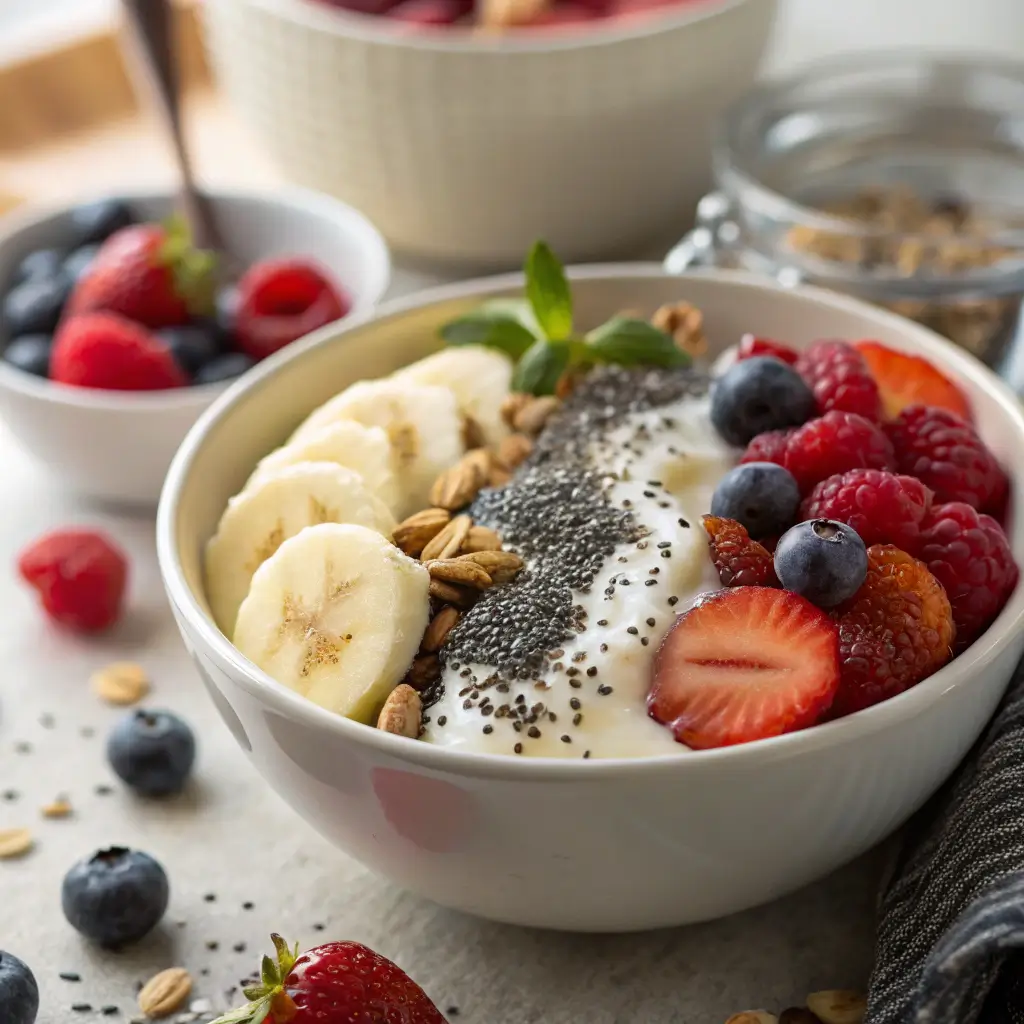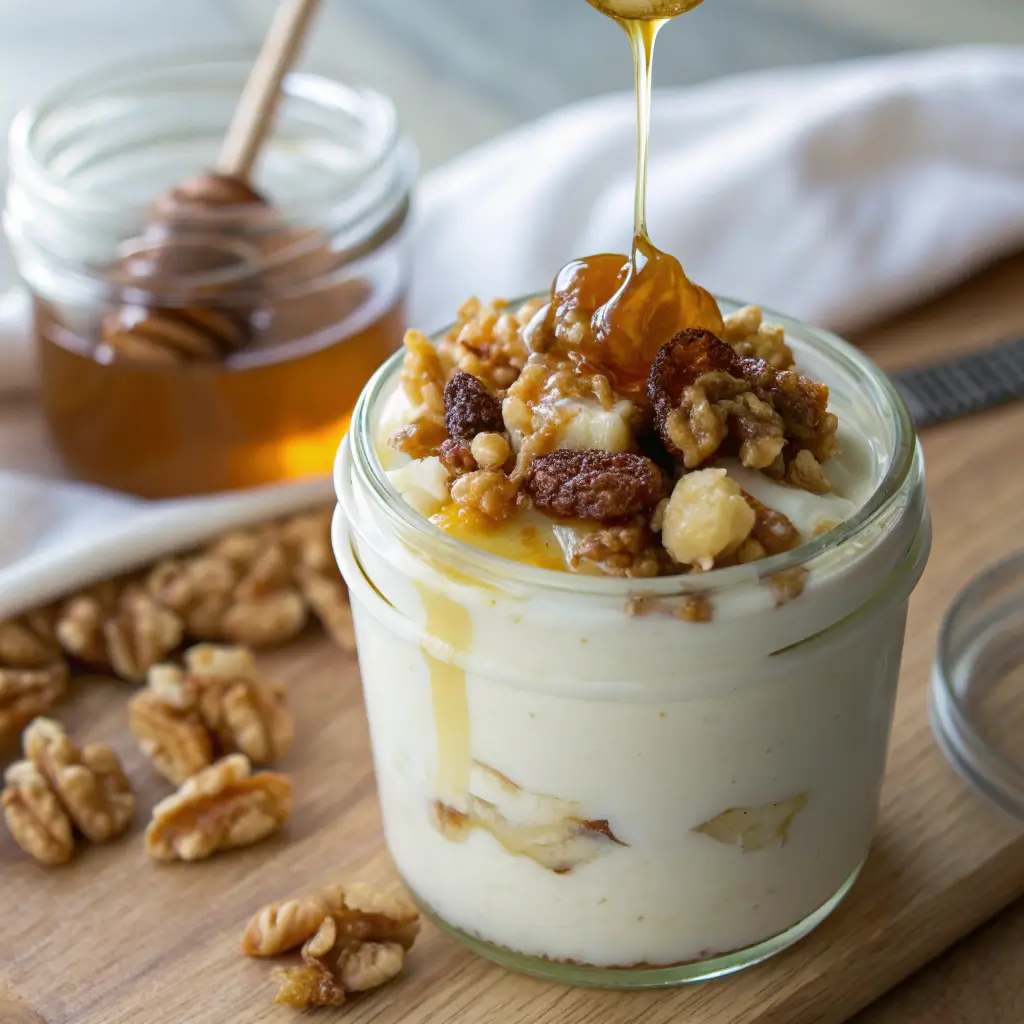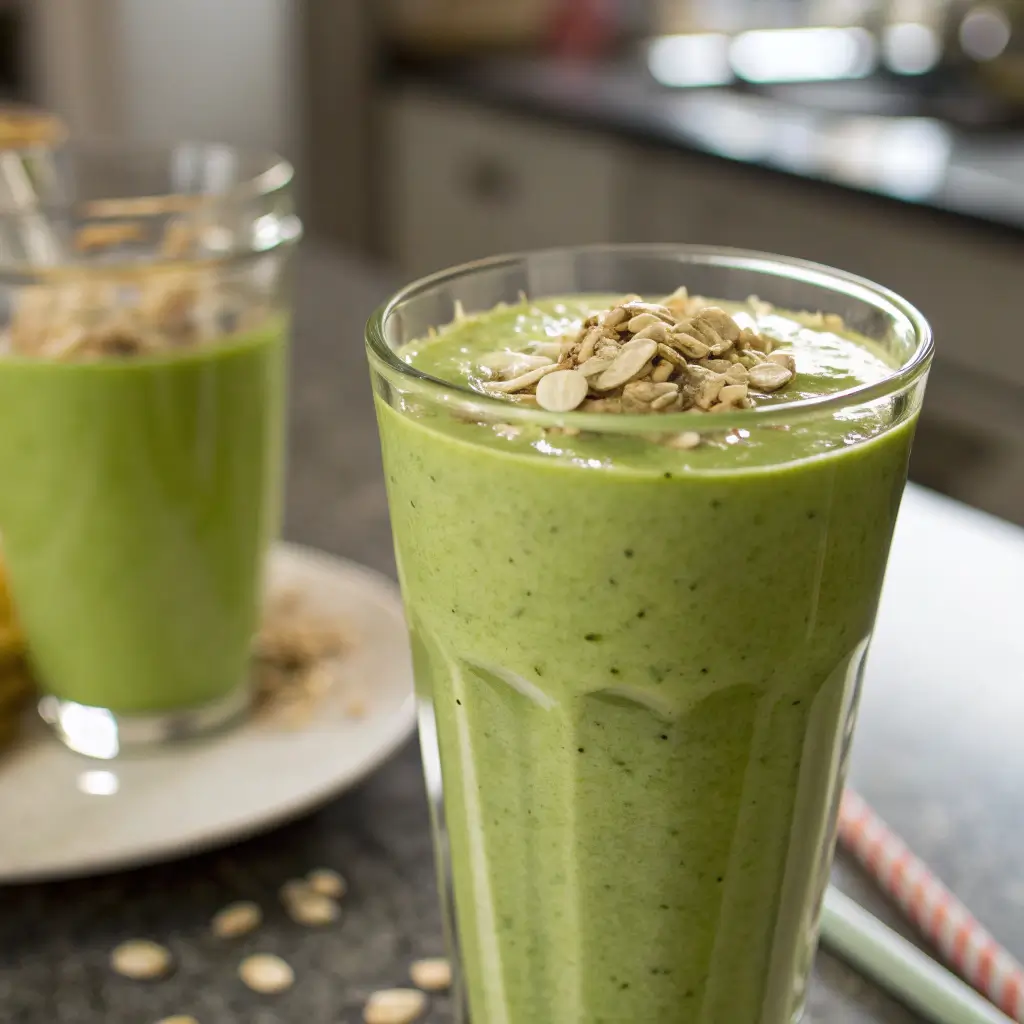Prebiotics and probiotics for digestive health are the secret weapons your gut needs to stay balanced, happy, and strong. Think of them as the tag team that fuels good bacteria and boosts your body’s natural defenses. When your gut microbiome is thriving, digestion runs smoothly, immunity gets a lift, and even your mood can improve.
Understanding how to combine these gut-friendly powerhouses is key to feeling your best. In this guide, we’ll explore what they are, the best food sources, how to pair them for maximum benefit, and even share tasty ideas like overnight steel cut oats that work as a delicious prebiotic breakfast. By the end, you’ll have practical, easy ways to make prebiotics and probiotics for digestive health a natural part of your everyday routine.

Table of Contents
For more gut-friendly recipes and tips, follow us on Facebook for daily ideas.
Looking for more comforting, high-energy breakfast inspiration? Check out High Protein Vegan Overnight Oats — it’s another easy, nutritious recipe that pairs perfectly with your morning routine.
Understanding Gut Health and Why It Matters
What is gut health?
Prebiotics and probiotics for digestive health start with understanding what your gut actually is.
Gut health refers to the balance and function of the microorganisms living in your digestive tract—known collectively as the gut microbiome. Your gut isn’t just a food-processing system; it’s home to trillions of bacteria, viruses, and fungi, many of which play a crucial role in your overall health. A healthy gut has a diverse range of beneficial bacteria that work together to break down food, absorb nutrients, and support your immune system. On the flip side, when this balance is disrupted—often called “dysbiosis”—it can lead to issues like bloating, constipation, weakened immunity, and even mood changes. That’s why supporting the right bacteria through prebiotics and probiotics for digestive health is so important.
The gut microbiome’s role in digestion, immunity, and mood
Your gut microbiome is like a bustling city, with each microbe performing a specialized job. Good bacteria help digest fiber, produce vitamins like B12 and K, and create short-chain fatty acids that keep your colon healthy.
They also act as a shield against harmful bacteria by competing for resources and producing natural antimicrobials. But the benefits go beyond digestion. About 70% of your immune system is housed in your gut, meaning a healthy microbiome helps fend off illness. Research even links gut health to brain health through the “gut-brain axis,” showing that your digestive system can influence stress levels, mood, and mental clarity. When you make prebiotics and probiotics for digestive health part of your daily routine, you’re not just protecting your stomach—you’re supporting your entire body from the inside out.
Looking for more comforting, high-energy breakfast inspiration? Check out High Protein Vegan Overnight Oats — it’s another easy, nutritious recipe that pairs perfectly with your morning routine.
Prebiotics – The Fuel for Healthy Bacteria
What are prebiotics and how do they work?
If probiotics are the good bacteria in your gut, then prebiotics are their favorite meal. Prebiotics and probiotics for digestive health go hand in hand because prebiotics are the non-digestible fibers that feed beneficial bacteria, helping them grow and thrive. These fibers travel through your digestive system largely untouched until they reach your colon, where your gut bacteria break them down into compounds that benefit your health—like short-chain fatty acids. This process not only supports digestion but also strengthens your immune system and may reduce inflammation.

Best prebiotic foods for a healthy gut
Nature offers plenty of delicious ways to get more prebiotics into your diet. Some of the best sources include:
- Bananas (especially slightly green ones)
- Oats (rolled, steel-cut, or blended into high protein vegan overnight oats)
- Garlic and onions
- Asparagus and leeks
- Apples and berries
- Chicory root (often added to energy bars or coffee substitutes)
Including these foods daily can give your good bacteria a steady source of fuel. If you’re making a breakfast like overnight oats, consider tossing in bananas or berries for a double boost. By consistently pairing prebiotics and probiotics for digestive health—whether in meals or snacks—you create the perfect environment for a thriving gut microbiome.
Check out these adaptogenic overnight oats that blend gut health with stress support
Probiotics – The Good Bacteria Boosters
Probiotic-rich foods and their benefits
If prebiotics are the fuel, probiotics are the live “good” bacteria themselves. They help restore and maintain a healthy gut microbiome, making prebiotics and probiotics for digestive health the ultimate team. Probiotics work by introducing beneficial strains into your digestive tract, crowding out harmful bacteria, and enhancing your gut’s natural defenses. Common probiotic-rich foods include yogurt with live cultures, kefir, sauerkraut, kimchi, kombucha, fresh pickles, and even some cheeses like cottage cheese and buttermilk. These foods can support digestion, reduce bloating, and strengthen immunity.
When and why to take probiotic supplements
While food should always be your first choice, probiotic supplements can be helpful in certain situations.
If you’re taking antibiotics—which can wipe out both good and bad bacteria—a probiotic can help replenish your microbiome. People with digestive conditions like IBS, Crohn’s disease, or ulcerative colitis may also benefit from targeted strains recommended by a healthcare provider. Some supplements contain single strains like Saccharomyces boulardii, while others offer multi-strain blends with Lactobacillus and Bifidobacterium. To maximize results, pair your supplement with a diet rich in prebiotic foods, because prebiotics and probiotics for digestive health work best when they’re together. For an easy win, try adding yogurt or kefir to breakfast, or blend them into recipes like Greek yogurt overnight oats.
The Perfect Prebiotic and Probiotic Pairing
Why taking both together can improve gut health
On their own, prebiotics and probiotics are great, but when you combine them, you create a powerful foundation for wellness. This pairing—known as a synbiotic relationship—is one of the most effective ways to support prebiotics and probiotics for digestive health. Prebiotics feed the probiotics, helping them grow stronger and survive longer in your system. When you get both at the same time, you’re not just adding healthy bacteria—you’re also giving them the fuel they need to work at their best. This can improve digestion, reduce bloating, boost nutrient absorption, and strengthen your immune system. Think of probiotics as seeds planted in your gut, and prebiotics as the sunlight and fertilizer that help them thrive.
The best prebiotic and probiotic combinations
Some of the simplest meals naturally deliver prebiotics and probiotics for digestive health without much effort. Try these tasty combos:
- Yogurt with banana slices – live cultures plus resistant starch
- Kefir blended with oats and berries – fermented milk plus fiber-rich fruits
- Sauerkraut on whole-grain toast – fermented cabbage plus prebiotic grains
- Overnight oats topped with Greek yogurt and chia seeds – fiber, probiotics, and omega-3s in one bowl
The more often you pair these, the more consistently you’ll be feeding your gut the right balance of nutrients and beneficial bacteria. Even simple recipes like healthy chocolate overnight oats stirred with probiotic-rich yogurt can be an easy way to enjoy prebiotics and probiotics for digestive health every morning.
Prebiotic Breakfasts – Overnight Oats and More
Overnight oats as a prebiotic powerhouse
One of the easiest and most delicious ways to enjoy prebiotics and probiotics for digestive health is by starting your day with overnight oats. Oats are naturally rich in beta-glucan fiber, which acts as a prebiotic, feeding the good bacteria in your gut. When you mix them with ingredients like yogurt or kefir, you get probiotics too—making breakfast a gut-friendly win. Overnight oats can be customized endlessly, so you never get bored, and they take just minutes to prep.
Creative overnight oats recipes for gut health
You don’t need a complicated recipe to get the benefits of prebiotics and probiotics for digestive health—just a few simple, whole-food ingredients. Here are some flavor-packed ideas:
- Chocolate Peanut Butter Overnight Oats – Try this creamy, dessert-like breakfast from our chocolate peanut butter overnight oats recipe. Peanut butter adds protein while oats bring prebiotic fiber.
- Creamy Overnight Oats with Protein Powder – A great post-workout option that blends plant-based protein with prebiotic oats. Check out creamy overnight oats with protein powder for a smooth, satisfying start to the day.
- Banana Walnut Overnight Oats – The resistant starch in bananas makes them a great prebiotic, especially when paired with probiotic-rich yogurt.
- Berry Chia Overnight Oats – Chia seeds offer healthy fats and fiber, while berries bring antioxidants to the table.
You can also browse our Pinterest boards for endless overnight oats inspiration.
By building your breakfasts around these recipes, you can enjoy prebiotics and probiotics for digestive health in a way that feels indulgent but is still deeply nourishing. Pair your oats with a side of kefir or top with Greek yogurt for an extra probiotic punch.
Are Green Bananas and Other Foods Good Prebiotics?
The role of green bananas in gut health
Green bananas are an often-overlooked source of prebiotics and probiotics for digestive health—well, technically just the prebiotic part. They’re rich in resistant starch, a type of carbohydrate that resists digestion in the small intestine and makes its way to the colon, where it feeds beneficial bacteria. This helps increase short-chain fatty acid production, which can improve colon health, reduce inflammation, and support steady energy levels. The greener the banana, the more resistant starch it contains, so if you can handle the slightly less-sweet taste, they’re a great gut-friendly snack or smoothie ingredient.

Other lesser-known prebiotic-rich foods
Beyond green bananas, there are plenty of unsung heroes for prebiotics and probiotics for digestive health. Some standout options include:
- Jerusalem artichokes – One of the highest natural sources of inulin, a potent prebiotic fiber
- Leeks – Mild in flavor but packed with gut-friendly compounds
- Dandelion greens – Excellent for both digestion and liver support
- Barley – A versatile grain with beta-glucan fiber for prebiotic benefits
- Cocoa – Pure, unsweetened cocoa powder offers polyphenols that act as prebiotics
Incorporating a mix of these foods alongside probiotic-rich options like yogurt, kefir, and fermented vegetables helps ensure your gut bacteria stay happy and diverse. For an easy breakfast, try blending green bananas with oats, yogurt, and berries to pack in prebiotics and probiotics for digestive health in one satisfying meal.
Explore more :
Here are some similar recipes related to gut brain overnight oats :
| probiotic overnight oats |
| magnesium overnight oats |
| nootropic morning oats |
| fermented oats recipe |
| adaptogenic overnight oats |
| electrolyte overnight oats |
Prebiotics, Probiotics, and Special Diets
Gut health for vegans, vegetarians, and dairy-free eaters
You don’t have to eat dairy or animal products to benefit from prebiotics and probiotics for digestive health. Many plant-based foods naturally contain both. For probiotics, options like fermented vegetables (sauerkraut, kimchi, pickled beets), kombucha, miso, and tempeh are all vegan-friendly. For prebiotics, the list is even longer—oats, bananas, apples, asparagus, garlic, and legumes are excellent sources. A simple vegan breakfast might include high protein vegan overnight oats topped with berries and chia seeds for a full gut-health boost.
Probiotic options for people with digestive conditions
Those with IBS, Crohn’s disease, or ulcerative colitis may need a more targeted approach to prebiotics and probiotics for digestive health. Some probiotic strains—like Lactobacillus plantarum or Bifidobacterium infantis—have been studied for their potential to ease symptoms such as bloating, diarrhea, or constipation. Prebiotic intake may also need to be adjusted, as certain fibers can cause discomfort in sensitive individuals. Working with a registered dietitian or gastroenterologist can help you identify the right strains and prebiotic sources for your needs. Pairing them carefully ensures you’re getting gut support without triggering unwanted symptoms.
Looking for more ways to make breakfast feel like a treat? Check out Healthy Chocolate Overnight Oats — another cozy recipe that satisfies your sweet side without the guilt.
FAQs About Prebiotics and Probiotics
What is the best additive for overnight oats?
The best additive depends on your goals, but for prebiotics and probiotics for digestive health, Greek yogurt is a great choice because it provides live probiotic cultures. Adding bananas, berries, or chia seeds boosts the prebiotic fiber content, creating a synbiotic breakfast that supports gut health.
Are overnight oats a prebiotic?
Yes—oats are a natural source of beta-glucan fiber, which acts as a prebiotic by feeding beneficial gut bacteria. When paired with probiotic foods like yogurt or kefir, overnight oats become a complete prebiotics and probiotics for digestive health meal.
Are green bananas a good prebiotic?
Absolutely. Green bananas are rich in resistant starch, which functions as a powerful prebiotic fiber. They help fuel the good bacteria in your gut, making them an easy and affordable way to support prebiotics and probiotics for digestive health.
What is the best prebiotic and probiotic combination?
One of the most effective combinations is yogurt (probiotic) with oats or bananas (prebiotic). Other great options include kefir with berries, sauerkraut on whole-grain bread, or overnight oats topped with probiotic-rich Greek yogurt. These pairings allow prebiotics and probiotics for digestive health to work together, improving digestion, boosting immunity, and supporting a healthy microbiome.
Conclusion – Building a Gut-Friendly Lifestyle
Simple daily tips to support your microbiome
Caring for your gut doesn’t have to be complicated. The easiest way to include prebiotics and probiotics for digestive health is by making small, consistent choices each day. Add a serving of fermented food like yogurt, kefir, or sauerkraut to your meals. Include fiber-rich fruits, vegetables, and whole grains to give good bacteria the fuel they need. Plan simple breakfasts, like overnight steel cut oats with yogurt and fruit, to make gut-friendly eating a habit rather than a chore.
When to seek professional advice
While most people can benefit from prebiotics and probiotics for digestive health, those with digestive conditions, immune disorders, or chronic illnesses should speak with a healthcare provider before starting new supplements. A professional can recommend the right strains, dosages, and food pairings for your individual needs. With the right guidance, you can build a gut-friendly lifestyle that supports digestion, immunity, and overall well-being—one delicious meal at a time.
And if you love discovering fun and beautiful breakfast ideas, follow us on Facebook or explore our creative boards on Pinterest for more dessert-inspired bowls and meal ideas.
